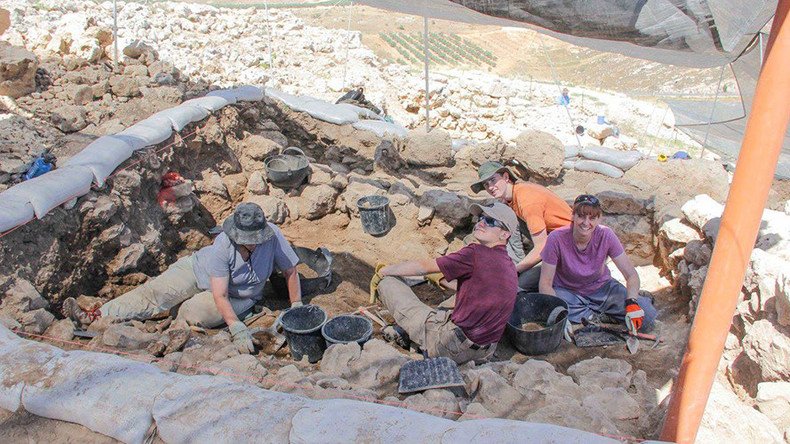Experts dig for Biblical tabernacle that ‘held Ark of the Covenant’

Archeologists searching for a structure that held the Ark of the Covenant have finished the first of a number of potential digs in the West Bank.
The Association of Biblical Research (ABR) is conducting the dig in the Shiloh area of the West Bank. Its researchers believe the tabernacle - which is said to have carried the wood and gold-plated chest containing the tablets of the Ten Commandments - was once housed at the site.
"We have just begun the process of accumulating evidence but we’re confident that the tabernacle rested at Shiloh," Dr. Scott Stripling, the project's director of excavations, told Fox News.
READ MORE: Secret Stone Age engravings can only be seen at night, archaeologists find
Archeologists have been particularly encouraged by the discovery of a huge amount of animal bones at the site, which Stripling believes may be related to a system of animal sacrifices. The bones have been sent to the US for testing.
NASA’s mega-powerful rocket a step closer with Mars missions on horizon (PHOTOS) https://t.co/LNViezVdkZ
— RT (@RT_com) July 26, 2017
“If the bones match the animals of the Biblical sacrificial system and the type and age specified, then we may be looking at evidence that the tabernacle sat nearby,” Stripling said.
Researchers found thousands of pottery shards, jewelry, swords, and other weaponry over the course of the four-week dig.
The Ark of the Covenant is said to have been brought to Jerusalem in 1000 BC. It disappeared when the Babylonians invaded and destroyed the city in 587 BC.
Some believe the Ark was melted down for its gold, while others claim it was stolen away to a cave in Jordan or Ethiopia.
READ MORE: 6,000yo ‘House of the dead’ discovered near Stonehenge (PHOTOS, VIDEOS)
The dig's administrator, Henry Smith Jr., outlined plans for future digs while speaking to RT.
“We will have one dig season per year, lasting four weeks each. Next year, we will be there May 20 to June 16, with a tour to follow. Volunteers come from all over the world, and no experience is required.”
Stripling and his team are basing their search on information gathered from Biblical texts.
“There are some who say the Bible is unreliable,” he told The Times of Israel. “We have found it to be very reliable. We’re taking the Bible as a serious historical document.”
However, Israel Finklestein, a professor of archaeology at Tel Aviv University, has issued a warning to researchers.
“Biblical traditions should be read on the background of their time of composition, the ideology of the authors, etc. One cannot approach them in a simplistic manner,” he said.












